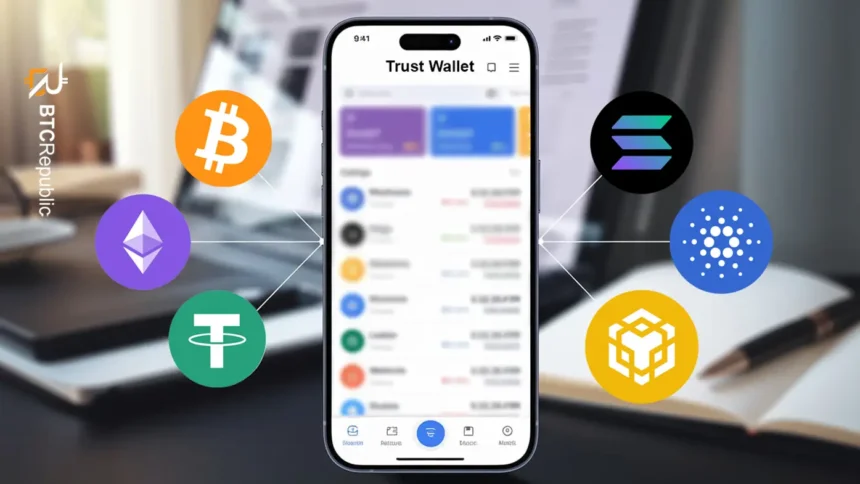The market for cryptocurrency wallets is characterized by intense competition for dominance. With brands always aiming to innovate, users eagerly anticipate the latest product launches.
Established by Victor Radchenko in November 2017, Trust Wallet is one of the industry’s leading competitors and boasts over 130 million users.
In terms of functionality, it is an easy-to-use, multichain, self-custody wallet that allows users to securely store and manage over 10 million crypto assets across more than 100 blockchains.
However, though it has other security features, the open-source wallet lacks the popular two-factor authentication mechanism.
Binance acquired Trust Wallet in July 2018. The Binance founder then described those behind Trust Wallet as “strong technically.”
So, are there any other technically strong alternatives to Trust Wallet out there? This guide analyzes the seven best Trust Wallet alternatives in the market in 2024.
The selection was based on similarity with Trust Wallet’s key attributes, particularly self-custody, multichain functionality, hot storage, and support for major coins such as Bitcoin Ethereum.
Best Trust Wallet Alternatives
You will find plenty of the best Trust Wallet alternatives on the internet. However, we are going to describe the best ones with proper research and considering their features. Here they are:
Coinbase

The Coinbase Wallet is a widely used self-custody cryptocurrency wallet. It supports various blockchains, including Bitcoin, Ethereum, Solana, Dogecoin, Polygon, Stellar Lumens, Litecoin, and XRP.
Additionally, it is compatible with Ethereum Layer-2 networks like Arbitrum, Avalanche C-Chain, BNB Chain, Fantom Opera, Gnosis, and Optimism.
With it, users can securely store cryptos and non-fungible tokens (NFTs) and connect to decentralized exchanges (DEX) to utilize their assets. For example, users can purchase meme coins and tokens for popular projects on supported networks.
When buying on a DEX, the app notifies users about newly launched tokens, encouraging them to conduct further research before purchasing.
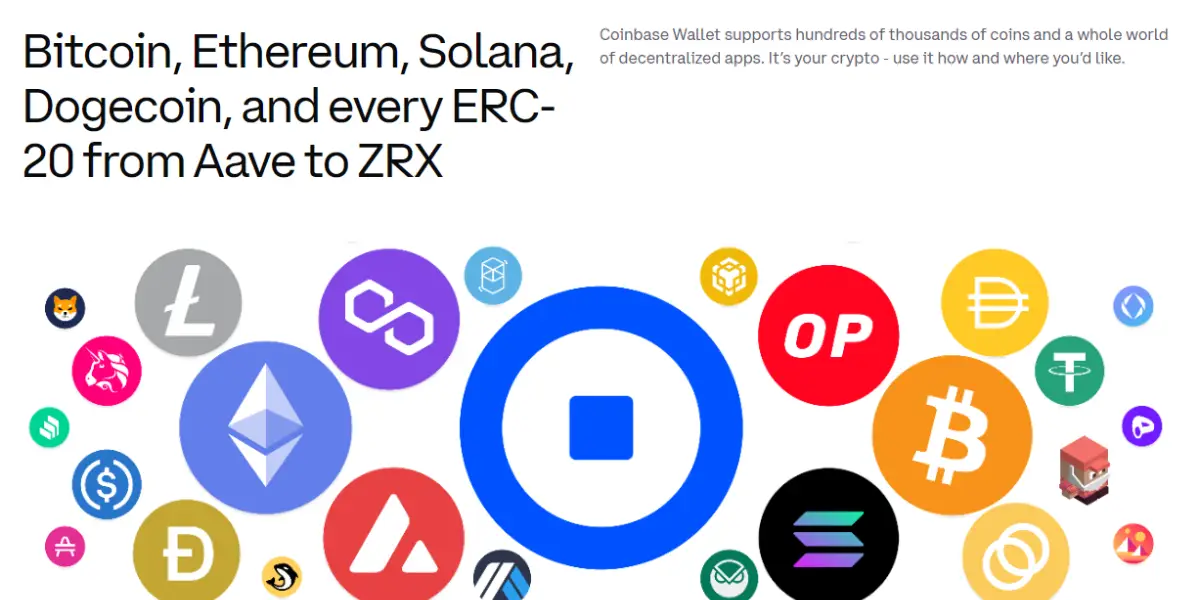
The Coinbase Wallet app can be accessed as a Chrome extension for desktop users and as a mobile app for Android and iOS. It is designed with ease of use in mind and is ideal for both beginners and experienced users.
While users can link it to their Coinbase exchange account, it is not necessary to have an exchange account to use the wallet. However, unlike Trust Wallet, all Coinbase Wallet users undergo a KYC process.
Pros
- Multichain wallet with support for lots of cryptos, including Bitcoin and Ethereum
- Supports two-factor authentication
- Ideal for both beginners and pros
- Open source SDK
- Includes an asset recovery tool
Cons
- Bitcoin support only available via the mobile app
Exodus

Exodus Wallet is a flexible self-custodial wallet for storing, managing, exchanging, and staking various cryptocurrencies.
It connects users to popular Web3 applications like Compound Finance, Aave, OpenSea, and Magic Eden, allowing them to borrow, trade NFTs, stake, and earn interest through these platforms.
Founded in 2015 by Daniel Castagnoli and Jon Paul Richardson, Exodus Wallet quickly earned a reputation for its attractive design and user-friendly interface.
Richardson, the technical expert, has contributed code that is still utilized by the Bitcoin network, while Castagnoli focuses on enhancing user experience.
Together, they lead a dedicated development team that consistently updates the Exodus Wallet.

Exodus provides software for Windows and Mac. It supports over 50 networks, including Bitcoin, Ethereum, Binance Smart Chain, and Solana, giving users access to major cryptocurrencies and trending meme coins.
Users can easily add coins from the supported networks to expand their cryptocurrency options and trade NFTs.
For those seeking offline storage, the wallet integrates with Trezor.
Its straightforward design makes it suitable for beginners entering the crypto world, and it offers excellent support to help users navigate this often complex market. KYC process is not required.
Pros
- Multichain wallet that supports a large number of cryptos, including Bitcoin and Ethereum
- Intuitive user interface ideal for beginners
- Integrates with Trezor hardware
- Responsive customer support
Cons
- 2FA not available
- Not completely open-source
OKX
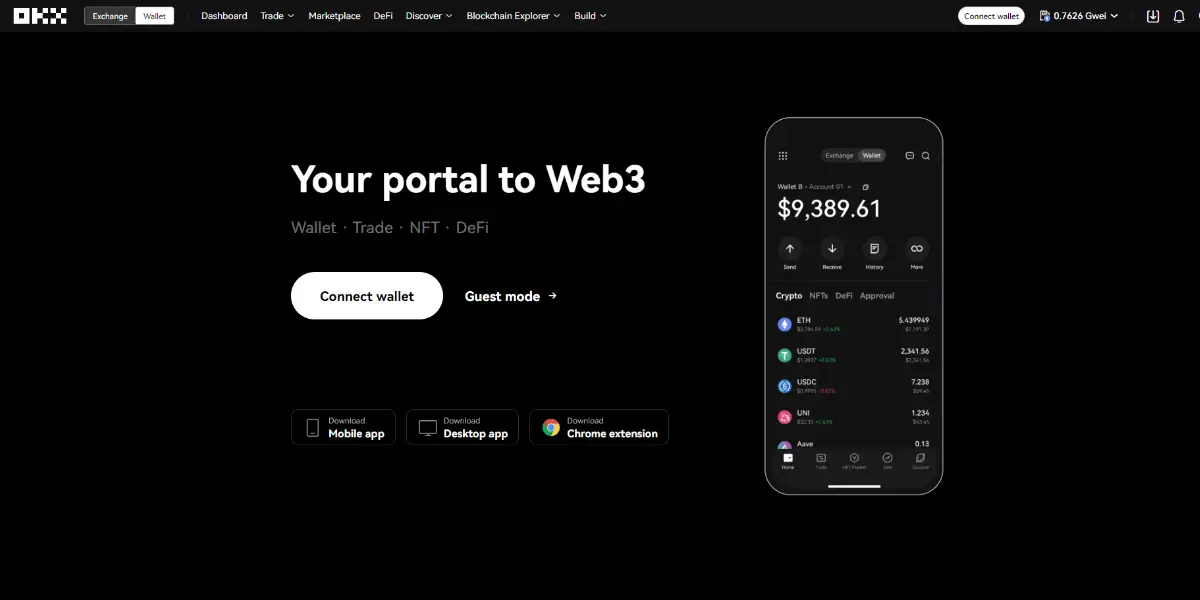
Seychelles-headquartered non-custodial OKX is a leading provider of Web3 integration solutions for wallets, DEX, NFT, DeFi, and more. It has users in over 100 countries and ranks as one of the best Trust Wallet alternatives for high yields on idle crypto investments.
It has a ‘bridge aggregator’ linking more than 200 decentralized exchanges. Because of the aggregator, users don’t need to leave the wallet while earning yields.
Apart from earning through staking, you can also earn through options such as liquidity farming and savings accounts.
Another area that ensures OKX is among the best Trust Wallet alternatives is the anonymous swapping of tokens. Just select the tokens you wish to swap, and OKX will do the rest, including securing the best rates.
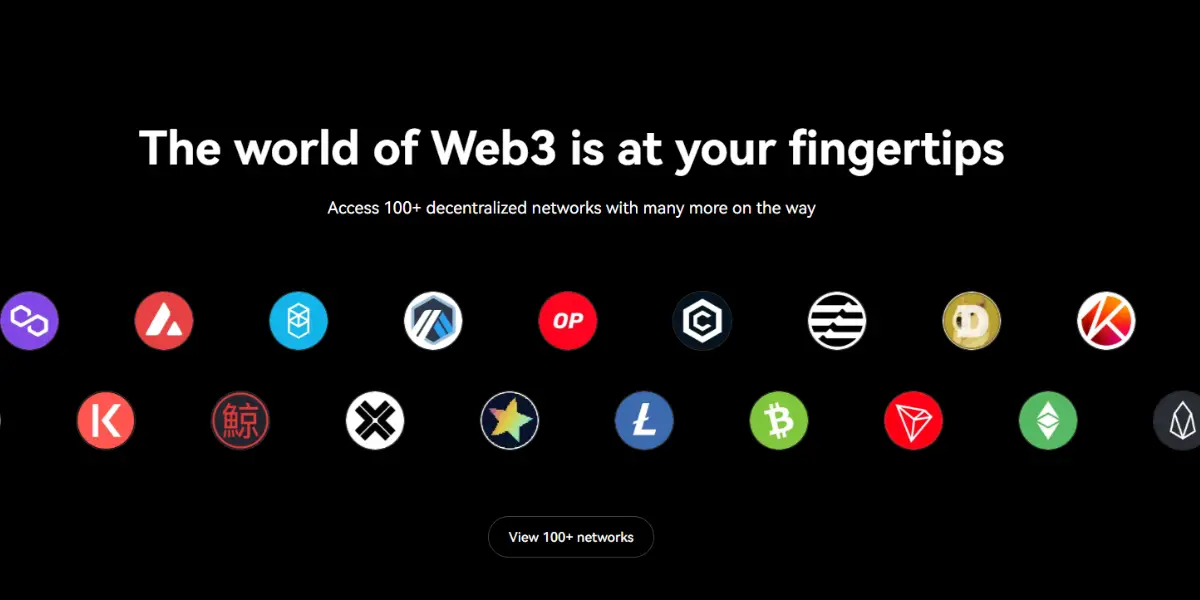
OKX supports over 60 blockchain networks, including major chains such as Bitcoin, Ethereum, Fantom, BNB Chain, Polygon, Solana and Avalanche.
The completely decentralized wallet is independent of OKX’s main exchange in terms of operations. However, you do not need a separate account to use the wallet section.
Security-wise, the OKX wallet deploys protective measures that include biometrics and a PIN. Users are also required to complete a KYC process.
They can also switch to the Multi-Party Computation (MPC) storage option. MPC is a technology that helps to distribute private keys across a multiplicity of devices, each of which can only access a particular segment of the keys.
This arrangement implies that a remote hack to access the wallet will be unsuccessful.
Pros
- Multichain wallet with support for many cryptos, including Bitcoin and Ethereum
- Enhanced security tools when compared to Trust Wallet – including MPC storage
- 2-factor authentication
- Open source code
Cons
- There have been complaints of hidden charges
- Advanced trading tools that can be challenging for beginners
Crypto.com
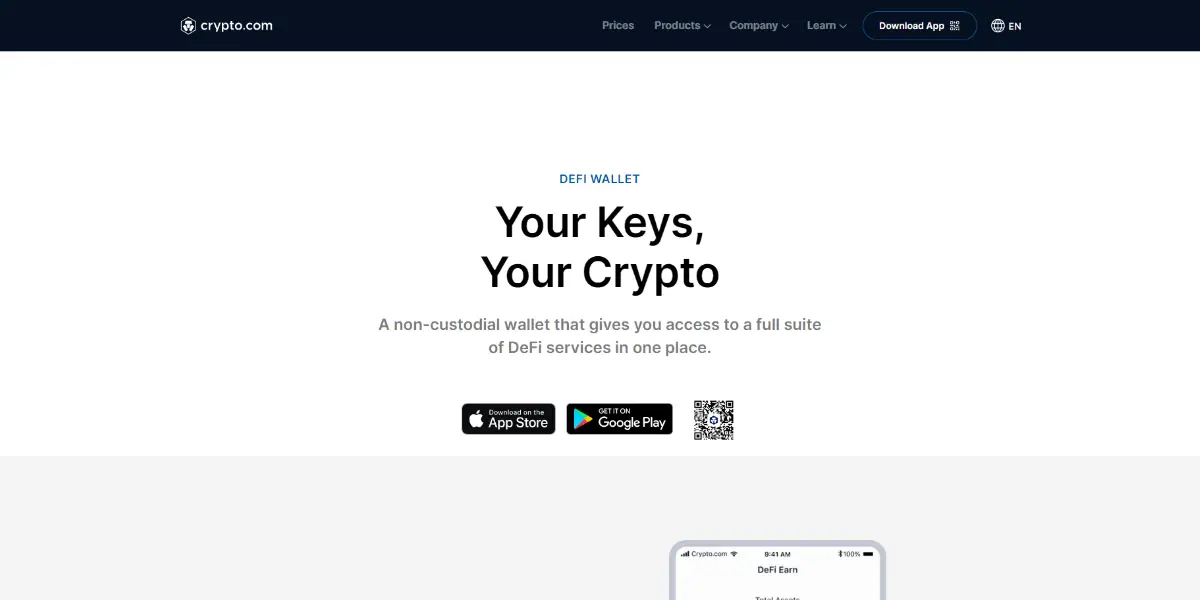
The Crypto.com DeFI Wallet was developed by the Crypto.com exchange, which ranks among the leading cryptocurrency exchanges worldwide. Crypto.com includes the exchange, a mobile app, and the newly introduced Crypto.com DeFi Wallet.
While both the exchange and the mobile app are custodial wallets, the Crypto.com DeFi wallet operates as a non-custodial wallet, similar to Trust Wallet. Together, these three applications form a cohesive ecosystem.
Since its launch in 2020, the Crypto.com wallet has gained recognition as one of the top DeFi wallets available. It supports connecting, mining, trading, swapping, and farming on advanced DeFi protocols.
For those exploring NFTs, the Crypto.com wallet allows you to view your NFTs, check their availability, and share them on social media.
It can be accessed through a desktop extension or on Android and iOS devices. Every user is also required to undergo a KYC process.

For those seeking a blend of online and offline storage, the Crypto.com DeFi Wallet is compatible with Ledger, a well-known cold wallet storage option.
Users can manage many cryptocurrencies across over 35 blockchains, including over 700 tokens. In terms of security, the Crypto.com Wallet employs strong encryption to safeguard users’ private keys.
Additional protections include biometric security and two-factor authentication for logging in.
For beginners, the Crypto.com DeFi Wallet is an excellent introductory option as it provides essential features without overwhelming complexity.
Pros
- Multichain wallet with support for several cryptos, including Bitcoin and Ethereum
- 2FA available
- Open source
- Great for beginners
Cons
- Concern about low customer service
- Some users may find it more complex to use than DeFi wallets
BitGet

Founded in 2018, Bitget (formerly Bitkeep) is a world-class decentralized multi-chain wallet with over 20 million users worldwide. It supports over 100 public chains, 250,000 tokens, and 100 swap services and combines the attributes of a hot and cold wallet to ensure optimal user security.
With this combination, users can trade seamlessly under the assurance that their assets are highly protected.
Notably, Bitget is not only a conventional wallet but also an all-in-one solution that integrates a holistic assortment of functionalities targeting the varying needs of crypto enthusiasts.
These include basic wallet functions like storing tokens and advanced services like aggregating market data, launchpad capabilities, DeFi investment services, NFT trading, and DEX integration, among others.
The aggregation of many mainstream DEXs helps crypto newbies trade at the most cost-effective prices. In addition, support for mainstream NFT marketplaces helps ensure increased access to digital assets for millions of users.

There’s also the automatic slippage feature that reduces transaction costs. Support for multiple chains, including relatively newer ones such as Scroll, zkSync, and Base, makes the wallet suitable for airdrops.
Users will enjoy full device compatibility courtesy of a mobile app and desktop browser extension. Enhance your experience by easily switching between your various devices whenever needed.
Because of its holistic approach, Bitget has been likened to a combination of MetaMask, Dextools, and cross-chain bridges, all seamlessly integrated into one platform.
This broad-based approach enhances user experience while positioning the company as a key crypto industry player. Bitget users must pass through a KYC process.
Pros
- Multichain wallet that supports a host of cryptos, including Bitcoin and Ethereum
- All-in-one solution
- Two-factor authentication
- Lower transaction costs
Cons
- Frequent updates may enhance security but can overwhelm some users
Guarda

If you are looking to store various cryptocurrencies on different devices, Guarda could be a great choice.
Similar to Trust Wallet, it supports more than 50 blockchains and thousands of cryptocurrencies and does not require KYC verification. GUARDACO LDA, the company that created Guarda Wallet, was founded in 2017 within European Union jurisdiction.
Since its inception, it has consistently advanced toward its aim of developing products related to blockchain technology, including the Guarda Wallet.
Guarda allows you to store, swap, and trade your digital currencies. You can also stake some cryptocurrencies, such as Ethereum, Cardano, Tron, Harmony, Tezos, and Cosmos, which can lead to significant rewards, often in double digits.
Furthermore, Guarda Wallet provides a prepaid Visa card that can be either virtual or physical.

Given the security issues in the cryptocurrency world, where scams and hacks are common, Guarda prioritizes your safety. The wallet’s strong encryption methods, including AES, protect your data and transactions.
Additionally, it offers security features like Face ID and Touch ID. For extra safety, you can use cold storage by connecting to offline devices made by Ledger.
Multiple wallet versions are available, including options for the web, iPhone, Android, a Chrome browser extension, and a desktop wallet compatible with Windows, Linux, macOS, Ubuntu, and Debian.
Pros
- Multichain wallet with support for plenty of cryptos, including Bitcoin and Ethereum
- Great customer service
- Two-factor authentication
- Open-source
- Prepaid Visa card services
- Cold storage capability
Cons
- Third-party integrations can be confusing for beginners
SafePal

Binance-backed SafePal is a versatile crypto wallet that provides a hybrid of seamless hot and cold storage solutions. Those who use both types of wallets can enjoy enhanced functionality and flexibility.
Users can access software options through a wallet app or a browser extension.
SafePal’s flexibility is further enhanced by its support for over 15 languages and more than 10,000 digital assets from over 100 blockchains.
Additionally, its wallets are Web3-enabled, allowing users to engage with decentralized applications, trade NFTs across various marketplaces, and explore DeFi projects, among other functionalities.
So, how safe is SafePal? Whether you choose the app, the browser extension, or the hardware option, each is equipped with robust security measures.
All three wallet types are non-custodial and have advanced security features like two-factor authentication, biometric login, and an air-gapped cold storage system.
Pros
- Multichain wallet that supports many cryptos, including Bitcoin and Ethereum
- MFA authentication
- Open source
- Integrated QR code feature to scan codes and quickly transfer funds
- Air-gapped signing mechanism for signing outgoing transactions without the need for Bluetooth, WiFi, or cables
- In-built Binance API for trading and staking
- EAL5+ technology for enhanced security
Cons
- Hardware version integrates only with SafePal software
- Some users have previously reported Bluetooth connectivity challenges that can slow down transaction speeds
Conclusion
Binance-owned Trust Wallet is a popular custodial and multichain wallet that supports major blockchains such as Bitcoin, Ethereum, and several others.
However, the crypto industry is far from a monopoly since there are many best Trust Wallet alternatives on the market.
The seven wallets discussed above are good Trust Wallet alternatives that were chosen based on certain characteristics they have in common with Trust Wallet.
These characteristics have kept some established brands like MetaMask, Electrum, and Trezor off the list.
FAQs
-
What is a Trust Wallet?
Trust Wallet is a secure, self-custody crypto wallet that supports 10 million crypto assets across more than 100 blockchains. It enables users to buy, sell, stake, swap, transfer, and earn cryptocurrencies in one place and can be used on iOS, Android, and desktop devices.
-
Are these seven wallets the only alternatives to Trust Wallet?
No. There are several other quality wallets out there. However, these wallets share some characteristics similar to those of Trust Wallet. For example, they are all multi-chain wallets that support both Bitcoin and Ethereum, unlike other popular products like MetaMask and Electrum.
-
Which of these wallets should one select?
Individual and even organizational needs and capabilities tend to vary. Ultimately, your best alternative to Trust Wallet will depend on variables such as needs, budget, tech-savviness, and more. Before deciding, try to research extensively, including checking if there are Trust Wallet alternatives on Reddit and other similar forums where you can learn from existing users.


